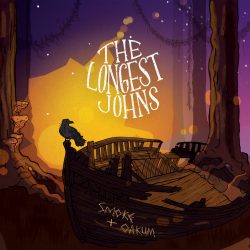Nautical folk – the great sound of storytelling, the sea and unadorned often unaccompanied voices.

‘The Longest Johns’ have been in existence since mid-2012 hailing from Bristol and currently consisting of Andy Yates, Dave Robinson, Jonathan “JD” Darley, and Robbie Sattin. They have produced and self-released 3 albums in that time. ‘Written in Salt’, ‘Between Wind and Water’, ‘Cures What Ails Ya’, and released, on the 21st of January, ‘Smoke and Oakum’, which is their first on the Decca label. They are perhaps most famous for the 2018 track, ‘Wellerman’, a song from the 1800s that went viral – was watched a lot – on Tik Tok with some 41 million-plus viewings.
The group perform traditional folk songs and sea shanties and if you might be expecting Fishermen’s Friends redux then certainly, ‘Smoke and Oakum’, offers a wider palette than that. The songs are evenly spread between traditional uncredited, those penned by identifiable others and the remainder written by band members. There are those that are sung a cappella but others have instrumental backing that helps to lift this above being merely a collection of shanties.
The opener is the famous Stephen Foster track, ‘Hard Times Come Again No More’, with a simple banjo figure that could have come from any American mountain shack – it’s only as the voices come in that the Englishness is apparent. By and large, the most successful singing is that where the four conjoin and the whole becomes much greater than the parts. The group harmonise very well, less successful is some of the solo singing and the individual voices are most effective collectively. Foster was known by some as the, ‘Father of American music’, which might be considered something of a stretch although in terms of his parlour and minstrel music it might be more accurate. ‘Hard Times’ considers the plight of the less fortunate and it sets the tone for a number of songs in the collection that consider the plight of the working man – the best of which is Ed Pickford’s, ‘The Workers Song’, – which also feature Seth Lakeman: ‘He’s the first one to starve / He’s the first one to die / He’s the first one in line / For that “pie in the sky” / And he’s always the last / When the cream is shared out / For the worker is working / When the fat cats about’.
These are songs that tell stories and other narrative highlights include the a cappella self-penned, ‘Pride of the White Star Line’, and, ‘Downed and Drowned. The ‘pride’ was in fact, ‘The Olympic’, which outlasted its sister ships, ‘The Titanic and, ‘The Britannic’, before it was finally broken up after long service in Jarrow. This was after a career such that she became known as, ‘Old Reliable’. Bits of her were subsequently spread far and wide, notably in the White Swan Hotel in Alnwick, Northumberland. ‘Downed and Drowned’, is a tale of four ships – three wrecks in various locations and the fourth is the story of the, ‘Mary Celeste’, – which as we know was found abandoned: ‘They’re downed, drowned in the depths below / Where the sun don’t shine and the winds don’t blow / When the timbers crack and the mainstay fails / We’ll all find peace wrapped up in our sails’.
The final track, ‘Beer is Great’, might be a bit too much of a novelty number as it veers from beer-hall to barbershop in its description of that most valued of commodities. As with all the self-penned numbers the wordplay is witty and clever but perhaps not to everyone’s taste in this case. It might though encourage you to investigate exactly what reinheirtsgebot means.
This is a really enjoyable album and it’s not just for those who like the smell of brine in their noses, or who value their beer. There aren’t many things better than a good sing-song and if you’ve ever been to a ‘come all ye‘ at a folk club then it may well bring back memories. Mine would be of a husband and wife couple who weren’t that good but did a brilliant, ‘Jesus Gonna Make it all Right’. It’s easy to imagine the four leads, swollen chested, belting out these tunes with the audience in tandem (or thereabouts!). Traditional songs generally survive because of their quality but the, ‘Johns’, are able to write their modern equivalents. They might be sung in jaunty fashion but the subjects can be more than serious and many will send the listener to the Internet in search of more information. The story of the, ‘Olympic’, is a fascinating slice of history in itself.
Go on – sing out!


